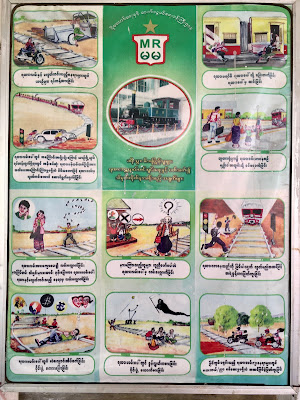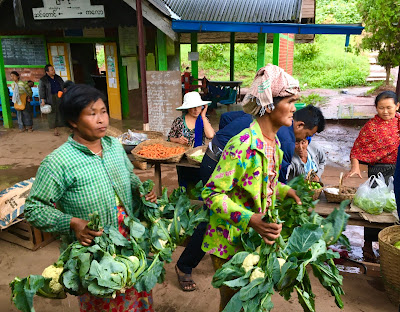 |
| Shwenyaung, a Station from Another Time... |
My Heart and I were up early, bustling around the bungalow, performing the last check for stray belongings. Out host had breakfast boxes ready for us, and a taxi was standing by. The plan was coming off perfectly. We needed to leave at 7 AM to ensure that we would be on the 8 AM slow train to Thazi.
The departure time was written in stone. Our smiling host had confirmed the time. The smiling woman at the travel kiosk had confirmed the time. The information on the internet agreed with all of the smiling people: Eight AM, Bubba. Be there or come back tomorrow.
The taxi whisked us away from Nyaungshwe, through the dusty streets and out onto the raised causeway along the lake shore. It is thirteen kilometers from Nyaungshwe to the train station in Shwenyaung. We did not know it, but at that moment our taxi was moving at a greater velocity than any other transport we would ride this day.
When we arrived at the colonial-era train station, everything was quiet. Too quiet. Before I could torture any more movie tropes, we found out why the station was so sleepy.
"No, train leave eleven o'clock today. No train eight o'clock."
Thus spake the most official looking of the clustered gents in the ticket office. There was no explanation, nor did I ask for one. What did it matter why? I was sure I could hear the soft snickering of the Travel Gods in the background. Welcome to a part of the world where schedules are theoretical.
It is 147 kilometers from Shwenyaung to Thazi via the twisty highway. The train takes a more circuitous route through the mountains, something more like 200 kilometers. That distance requires ten hours, twenty kilometers per hour, or about twelve miles per hour. When the three hour delay was added on, our arrival time in Thazi would be about nine PM. My Heart was not pleased, but there was nothing else to be done.
The first thing was to find a tea-shop. There is always at least one shop tea-shop near any station. Where else would the taxi drivers find a place to not work? This shop was a particularly good one. The owner was frying fresh Chinese donuts while his wife flipped and kneaded the dough. One of the sons plopped down our two cups, along with two piping hot strips of fried dough. Oh, hell yes! our total bill for two teas and two donuts: 800 Kyat (about fifty-five cents). We drank, we ate, we smoked, and time passed. There was a lot of time to spare.
 |
| Trains are Sneaky, Dangerous Things... |
Back on the rustic station platform, there was nothing to do but wander around. I poked around old train cars, smoked a cheroot, and learned about all the many ways a train can kill you if you aren't paying attention.
Here is where this blog veers into a photo essay, at least until the train arrives. How much can one write about waiting in an empty station? Oh, wait, I forgot to mention the schadenfreude of passing on the news of the delayed train to the newly arriving passengers-to-be There was some fun to be had in that.
 |
| The Ruins of the Past... |
What I took for an abandoned train wagon was, in fact, a working car. Not long after I took this photo, a train hooked up to the thing and hauled it off.
 |
| Our Train Cometh... |
The sleepy morning air was broken by the long whistles of our approaching locomotive. Yes, our train had finally cometh. The thing was a rolling museum piece, it's true, but it was a bona fide locomotive, and the only one we were going to get.
 | |
| Vintage Running Gear... |
It is down here amongst the running gear that one gets a clear picture of how old these trains really are. I am here to tell you, Friends and Neighbors, this ain't no Johnny-Come-Lately machinery. This stuff here is the Real McCoy.
 |
| An Upper Class Wanderer... |
After some shenanigans in the station, hand-loading piles of lumpy sacks and what-not, the whistle sounded again and our train lurched reluctantly to life. The little-train-that-might rolled across the last bit of flatland before the mountains. At the first slight incline, I was sure that I could hear the locomotive groaning in pain. Thus began our climb up into the foothills, up to the heights of the tea plantations that this train was built to serve. It was a long climb, and slow.
Words do not accurately describe our stately pace. I shot a few videos through the open window, videos which capture the awe-inspiring lack of speed our little train could sustain.
Here is the first video link, the train crossing a trestle with the snaky highway in the background:
Climbing out of Shwenyaung on the Slow Train
And here is the slow climb up the escarpment, the train curving back on itself through jungle and field:
The Real Slow Train: Shwenyaung to Thazi, Myanmar
The train stops in the middle of nowhere. It stops because there is only one track, and another slow train is coming from the opposite direction. It stops in any and every hamlet along the way. This is the market train. Piles of goods are loaded into the wagons, and other piles of stuff are unloaded. Lumpy bags of cauliflower, onions, and other produce are stashed in the aisles or behind seats. The Upper Class wagon is just as suitable for vege storage as the Ordinary Class.
Jungle scrapes the side of the car with leafy hands. Branches bounce along the roof. There is a train-sized hole punched through the jungle. The jungle grows back faster than the train wagons can knock it down. At first, the sound of a branch scraping the roof is alarming. After a few hours, one does not hear it anymore.
The train becomes a movie, a very slow avant-garde film that will take all the time it needs to tell a quiet story. We passengers aren't watching the movie, but rather we are in it: extras trapped inside the set of a few dilapidated train wagons. We are carried the length of a very long saga in which we play only the most minor of roles. Like Rosencrantz and Guildenstern, we are adrift in the long pauses between speaking lines.
The folks that live in these hamlets are mostly Pa'O people. They are a Tibeto-Burman people who have inhabited this region for over a thousand years. The Shan State saw it's share of conflict with the former Myanmar Junta. Those armed conflicts drove many Pa'O people into the refugee camps around Mae Hong Song in Northwestern Thailand.
A gentle afternoon rain begins to fall. I see a few parties of Farrang trekkers slogging along steep pathways. They follow their Pa'O guides, pause on the long walk to wave at the train.
The arrival of the slow train is the big event of the day in these remote jungle hamlets. The train sits in each tiny station until all of the business is done, every last sack loaded, and the conductors have finished buying their snacks.
The evening is upon us, and we begin our descent from the mountains. The train has been snaking back and forth in sinuous curves, but eventually the slope becomes too steep. Our little train full of produce begins to zig-zag down the jungle mountainside. The trains stops on a siding, encased in a green tunnel of overgrown foliage. A switch is thrown, and we begin backing down the slope, descending the first zig. Then comes another siding, another switch, and we are moving forward again, down the zag. Lurching backwards and forwards, with a long pause at each siding, the train worms its way down to the valley below.
 |
| "Night time on the City of New Orleans..." |
Night has fallen before we are on the lower slopes of the mountains. Insects pour into the train wagon, pulled in by the glow of lights and a death-wish. The dragonflies go into a feeding frenzy, bugs land on passengers, are brushed off, and the train keeps chugging into the darkness.
The conductors and baggage guys are playing cards, a blanket spread out in the aisle between the seats. The train finds the flatlands past the mountains and begins racing for home, speeding along at almost fifteen miles per hour, a velocity that is almost unbelievable.
Then we are there, pulling slowly into the station. We unkink ourselves from our seats, shoulder our packs, and slip past the huge bags of cauliflowers and who-knows-what. Back in Thazi, we know our way to the guesthouse. We are leaving the magic of the slow train behind. The memory of it will be more romantic than the last two hours actually were, but that is the nature of memory.
You can check it out here:
"Ghost Hats" at Literally Stories
Or perhaps
You can check out books, blog posts, book reviews, or even get a free book. Just look for the big button that says "FREE BOOK." It's kind of hard to miss. Happy reading!!








No comments:
Post a Comment